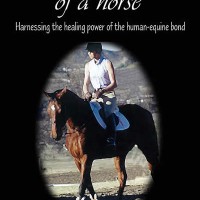
For those who work in trauma, the concept of repetition compulsion — or the tendency to recreate traumatic experiences that are similar to the original trauma — is nothing new. However, foreigners to the world of trauma can often shake their heads at the seemingly bazaar habit of those around them to “keep doing the same thing, expecting different results.” From the inside, it makes perfect sense. Your brain is simply trying to maintain what is now normal — that is operating in trauma mode, complete with elevated epinephrine, norepinephrine, and lowered serotonin. Yet, it is understandable that this behavior can defy logic, and put those immersed in it at odds with friends. The good news is that trauma specialists are well equipped to manage this reaction to overwhelming and terrifying circumstances. The not so good news is that those who’ve had trauma can unknowingly recreate it in their lives through their many relationships — even those with horses.
Think, for just a moment, of a friend or acquaintance that seems to always find himself/herself in the same dysfunctional, unhealthy, or even abusive, relationships. It seems that no matter what anyone says to this person about the “warning signs” she/he remains in denial, idealizing the new mate, and minimizing any risk. Yet, over and over again, the same thing happens. The rosy love affair ends in a nasty battle with sometimes legal consequences, and in worse cases, hostage children.
Now imagine the type of horse same this person may gravitate to. Most likely, this horse would be very similar to the new boyfriend/girlfriend. And the treatment would be the same too. The horse would probably be dangerous for the person, either because it is too young, too spirited, or too untrained, and the person would be in denial — again minimizing the risk. The person’s friends, and even the horse’s trainer (if there is one) would all warn him/her about the dangers of this situation, express their concern for his/her safety, and offer to help find a more suitable horse. Yet, here again, the person would deny the risk, idealize the horse (despite perhaps even having already been hurt by him/her), and refuse help. And just with the abusive human relationship, the end would the same. The person repeating the compulsion to trauma would get hurt.
Surprisingly, this situation happens all the time in the horse world, and the reaction of the perplexed horse trainers is always the same. “Why does she/he insist on keeping this horse even though it is dangerous?” they ask. “Does she/he want to get hurt?” they wonder.
The truth is, of course there is no conscious desire to become injured by a horse, yet the person has simply transposed his/her traumatic experiences onto the horse, repeating the compulsion to be in the abusive situation in a different way — this time on the other end of a set of flying hooves. And just like with human relationships, until the person is made aware of this tendency, she/he will likely continue the pattern.